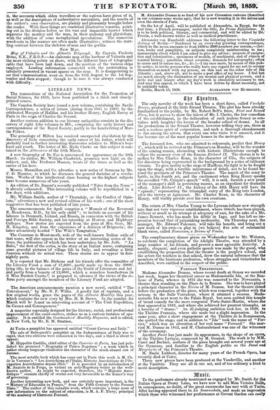PARISIAN THEATRICALS.
Madame Alexandre Dumas, whose recent death at Genoa we recorded last week, began her theatrical career as Mademoiselle Ida, at the Ban- lieue of Paris, whence in 1831 she was removed to the Noveautes, a theatre then standing on the Place de la Bourse. She was to have played a principal character in the Tiresa of M. Dumas, but the theatre closed before the production of the piece, which was removed, together with the actress,- to the Salle Ventadour, where it attained a success. Madan! moiselle Ida next went to the Palais Royal, but soon quitted this temple of broad comedy for the more congenial Porte-Saint-Martin, where she first appeared in 1833, and where she achieved her greatest triumphs, as a heroine of " drame." An ill-judging ambition took her, in 1839, to the Theatre Francais, where she made but a slight impression. In the same year, after a short engagement at the Theatre de la Renaissance, she quitted the stage, and in addition to "Ida" took the name of "Fen- rier,' which was an alteration of her real name " Ferraud." She mar- ried M. Dumas in 1842, and if. Chateaubriand was one of the witnesses of the ceremony. Another Faust has just made its appearance, in the shape of an opera, at the Theatre Lyrique, composed by M. Gounod. The work its by MX. Carne and Barbier authors of the piece brought out several years ago at the Gymnase, and familiar to the English public as the Faust anti Marguerite of the Princess's Theatre. M. Emile Lubbert, director for many years of the French Opera, hue recently died at Cairo. Three new pieces have been produced at the Vaudeville, and another at the Varietes. They are all in one act, and of too ordinary a kind to merit description.


























 Previous page
Previous page